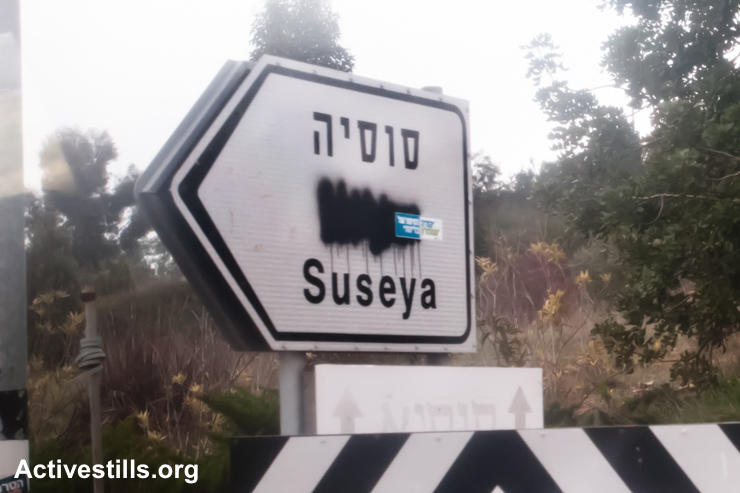Former Israeli ambassador Michael Oren says Jesus would be considered a settler if he lived in Bethlehem today. Such talk obscures the nature of the settlement enterprise and slanders Jesus.
Text and photos by Ryan Rodrick Beiler/Activestills.org

Former Israeli ambassador to the U.S. Michael Oren has been saying a lot of obnoxious things lately. His recent book angered Jewish-American journalists by twisting the truth and burning bridges with the liberal Zionist establishment. And while it’s clear that diplomacy is no longer Oren’s priority, he may have crossed the line from belligerence to blasphemy with his latest remarks.While preaching to the choir of the Knesset’s Christian Allies Caucus, Oren took the name of Jesus in vain, using it to defend the settler enterprise.
“Jesus, Mary, and John the Baptist would today be considered Jewish settlers in Bethlehem,” said Oren, according to The Jerusalem Post.
Mike Huckabee has been saying some stupid stuff too — essentially calling Obama a Nazi — but such dangerous absurdities are nothing new when it comes to his Middle East policy. The last time Huckabee ran for president, he laid a cornerstone in the East Jerusalem settlement of Beit Orot and expressed willful ignorance of geography and international law:
It is inconceivable in many ways that we would have to even argue and debate whether or not Israelis could live in Israel, not just in parts of Israel but anywhere in Israel they wished to live. … I cannot imagine as an American being told that I could not live in certain places in America because I was Christian, or because I was white, or because I spoke English.
Israelis can live in every part of Israel. It’s just that But Beit Orot is not Israel. East Jerusalem is not Israel. That’s why Israel does not grant the Palestinians in East Jerusalem and the West Bank the same civil rights as the Jewish Israelis who live in these same areas.

Are Oren and Huckabee really ignorant of what makes a settler a settler? According to international legal consensus, shared by virtually every other nation except Israel, all settlements are illegal. According to the International Committee of the Red Cross (ICRC):
It is unlawful under the Fourth Geneva Convention for an occupying power to transfer parts of its own population into the territory it occupies. This means that international humanitarian law prohibits the establishment of settlements, as these are a form of population transfer into occupied territory.
This is what makes settlements illegal. It’s not because they’re Jewish. It’s because they’re colonies built on occupied land outside of the state of Israel.

That’s also they key point in the unfolding case of the Palestinian village of Susiya and the Israeli settlement of Susya. While Israel considers the Palestinian village “illegal” because it doesn’t follow the rules of its occupiers, the rest of the world considers the nearby settlement Susya illegal because it was established on land outside of the state of Israel.
Of course, if you are a religious fundamentalist, you don’t care so much about international law. You only care about God’s law. But at least have the honesty to declare so openly when speaking about matters of international policy. That way, anyone in the arena of international diplomacy can decide whether or not to take anything you say seriously, and whether or not it’s a good idea for any country’s foreign policy to be guided by religious fundamentalists.

Oren offers another data point in this regard with the statement that preceded his Jesus remark: “God speaks only one language and it’s the language in which we are yelling at each other in the next hall.”
In other words, Oren believes in a God who only speaks Hebrew.
Jesus, on the other hand, also spoke Aramaic. It was the most common vernacular of his region, spoken by Jews as well as other ethnic and religious groups. Today, if Jesus lived in the region, he would almost certainly speak Arabic.

In his life and ministry, Jesus consistently identified with the oppressed and marginalized. He did not exploit his privileges at the expense of others, and he severely criticized those who did.
If he lived in Bethlehem, it would not be there as a settler stealing land, it would be in solidarity, struggling alongside the oppressed. Like many other Israeli Jews in that struggle, he may even get arrested, beaten up, or shot.

Do not misunderstand me. Solidarity activists should definitely not think of themselves as messianic. Like all people of privilege, myself included, we need to humble ourselves and listen and learn from “the least of these” who are suffering the most. But my Bible tells me that you will know a person’s true character “by their fruits.” Having listened to both firsthand, I find the attitudes and actions of those marching to save Susiya far more Christ-like than the entitled mentality of settlers living on Palestinian land.

So no Mr. Oren, Jesus would not preach the exclusive demands of the settler enterprise. He would be criticized for welcoming all peoples into the land — including African and Palestinian refugees — those your government considers “infiltrators.”
Jesus would want the best for his own people. He would risk the wrath of right-wing Israelis and hardline anti-normalizers alike.
Jesus would not seek security in walls, soldiers, fences and guns. He would practice nonviolent resistance, and condemn the logic of an eye for an eye—or 2,205 lives for for 71 lives.

He would be Christ at the checkpoint, Christ at the wall, Christ at the house demolition, Christ at the price tag attack, Christ at the refugee camp. He would be Christ in the Gaza fishing boat. He would be Christ among the rubble and under siege.
No Mr. Oren, today Jesus would not be considered a settler. He would be considered a subversive. He would not align with any established political group, but would be considered a dangerous revolutionary by the powers that be.
He was and would be a Jewish Palestinian, a Palestinian Jew. That’s how the Roman occupiers saw him: A Jewish troublemaker from the province of Palestine.

